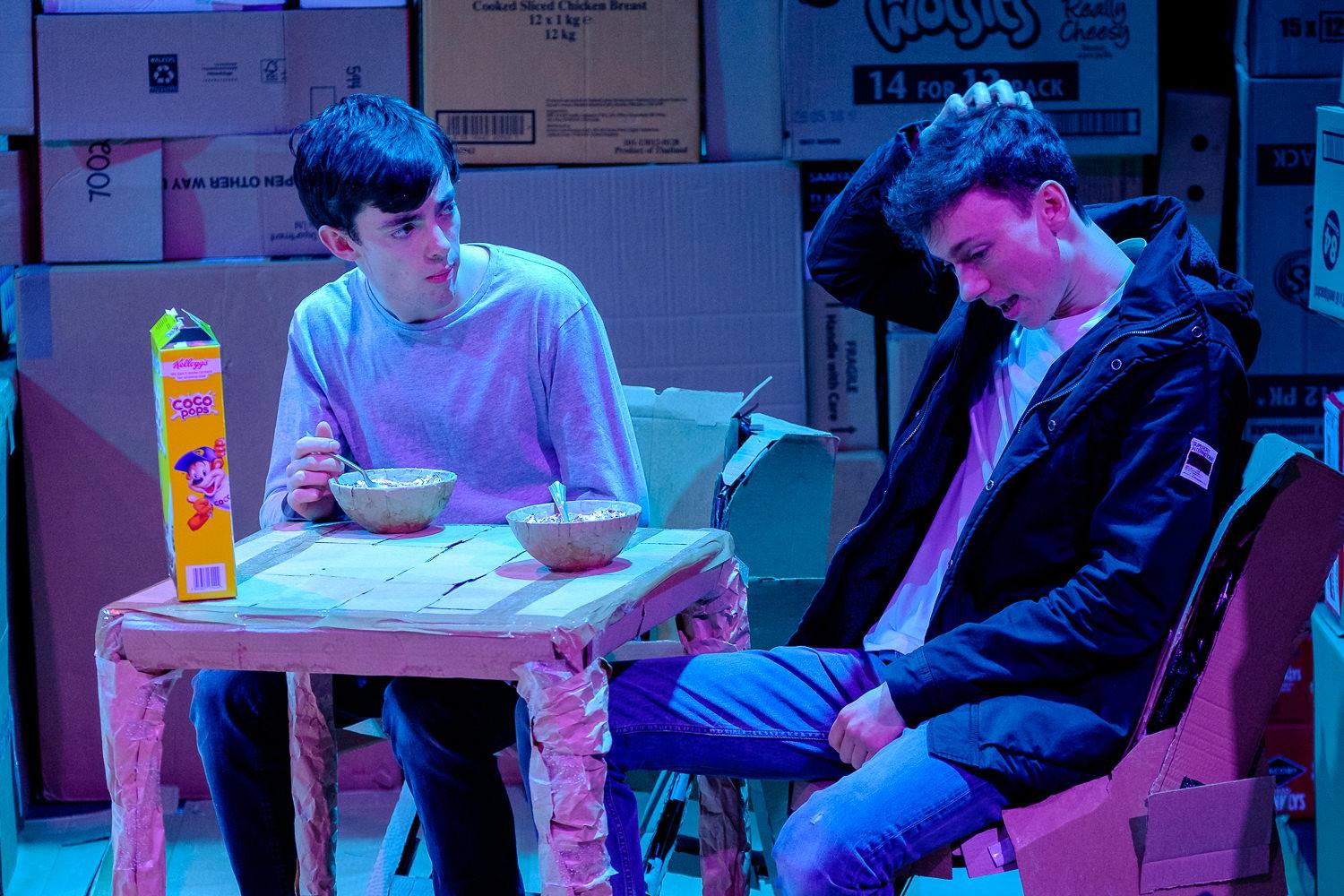Brilliant Adventures review: comic, conscientious and convincing
Last Saturday, as I sat in the Goose Nest after an eight-hour shift, all I could think about was how tired I was and how much my feet ached from serving coffee all day. However, Brilliant Adventures – the new production from WUDS – opened with punchy game-like music, red to blue flashing lights, and projected Tetris pieces that fell down the back screen and almost onto the cardboard boxes that framed the stage. Complementing the cardboard set, all the props were also cardboard-coated. Considering cardboard is associated with homelessness, the abundance of it on set forced the audience to assign value to the idea of ‘home.’ As this small apartment is all that Luke, Brilliant Adventures’ protagonist, owns and desires – alongside his privacy – the set succinctly defined the lack of opportunity and poverty in modern Middlesbrough.
The set succinctly defined the lack of opportunity and poverty in modern Middlesbrough
The set also played into the comedic relief as, Luke’s best friend, Greg, played by Dillon Rix, mentions how “skinny” the goldfish seemed whilst peering at a cardboard fish. Continuing the comedic value, Ben (played by Joe Taylor), a rich Londoner suspiciously searching for ‘business opportunities’, refers to Luke’s physics-defying invention as a “cardboard box” (which it was). After Ben stuck his head into the time machine, however, his baffled facial expression was sufficient in transforming the unimpressive box into the largest scientific breakthrough: a working time machine.
The juxtaposition between the non-naturalistic set and realistic acting style was jarring. Joe Matty played Luke, the unassuming genius, convincingly; he had the challenge of employing a stammer which defined him as the most vulnerable character in an already fragile community. Matty’s stutter was sustained throughout his performance and a friend who accompanied me even whispered, “does he really have a stutter, or is he just putting it on?” – perhaps the best compliment you can receive as an actor.
A wonderful moment where both Lukes sat on the sofa and slumped their shoulders in synchronisation was indicative of Grace Lovegrove’s conscientious and detailed direction
Matty’s poor posture and tense gait to portray Luke’s anxiety was essential later in Act II when Luke’s past self, played by Elliot Gale, appeared. Although Gale’s stammer was slightly under-performed in comparison to Matty’s, he did a wonderful job of inhabiting Luke’s tense physicality, which helped clarify to the audience that the two were playing the same character. Their duality was captured in a wonderful moment where both Lukes sat on the sofa and slumped their shoulders in synchronisation: indicative of Grace Lovegrove’s conscientious and detailed direction.
For the most part, Rhys Hillan played the tedious part of a tied-up junkie. His paternal monologue that concluded the first act started with audience interaction which seemed unconfident and thus misplaced, considering it was the only moment in the play in which the fourth wall is broken. However, as his characterisation strengthened, the audience warmed to him and enjoyed a funny, heart-felt close to the first act.
Dillon Rix managed to keep the audience in high spirits even when the play took more serious turns. In fact, Greg’s gormlessness but eagerness-to-impress was missed in Act II. The heavy subject matter, though gripping, was occasionally too drawn-out with pauses that deducted from the tension rather than added to it.
Rory Meade consumed the complexities of his character in a controlled manner; the audience could simultaneously empathise and disagree with his dire situation
However, Joe Taylor made a compelling, capitalistic villain, sustaining a rough London accent and condescending tone: particularly effective when he pulled out Luke’s tooth with a pair of pliers. The audience could only see his back, shaking and tensing, but it was believable and gruesome. Lovegrove’s confident direction of the scene in which Rob – Luke’s older brother, played by Rory Meade – confronts Ben’s violent attack was excellent. Throughout the scene, Taylor sat, calmly holding the knife that Rob had planned to attack him with. Although Rob was standing, higher in proxemics, it was Ben who commanded all the power on the stage.
This leads me to credit Meade’s stand-out performance. He consumed the complexities of his character in a controlled manner; the audience could simultaneously empathise and disagree with his dire situation – illegally drug-dealing to support his junky of a dad and disabled brother. Meade’s cocky body subsided when he projected a less confident persona, particularly around Luke. The audience was totally convinced of good yet short-sighted intentions and sympathised when Luke referred to him as the cause of all their problems. Meade effectively played the adventurous little boy that had become a misled adult and negotiated two sides to one character convincingly.
No scientific breakthrough or time machine was necessary to make this a memorable production: only the committed and perceptive work of its actors and production team.

Comments